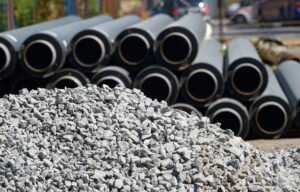 Lead pipes aren’t as common anymore in city pipes thanks to some great legislation from the 1960s. Once the science came out on how negatively impacted adults and children were from consuming lead runoff, it became obvious that we needed to overhaul our industrial plumbing systems to completely remove lead from the equation. That’s why you just don’t see lead pipes in large commercial buildings or other public buildings anymore, since those were the places heavily focused on when this change came about.
Lead pipes aren’t as common anymore in city pipes thanks to some great legislation from the 1960s. Once the science came out on how negatively impacted adults and children were from consuming lead runoff, it became obvious that we needed to overhaul our industrial plumbing systems to completely remove lead from the equation. That’s why you just don’t see lead pipes in large commercial buildings or other public buildings anymore, since those were the places heavily focused on when this change came about.
However, when it comes to residential plumbing in Spring Branch, TX, it’s unfortunate that there are still older homes that use lead pipes. We’re not saying this is anyone’s fault, older homes have a wonderful aesthetic and we understand why new homeowners might be drawn to them. But if your older home still has lead pipes in it, or has the possibility of having lead pipes, then we urge you to get them replaced immediately.
Why Homes Still Have Lead Pipes
Lead pipes have been around not just for the past hundred years, but for almost a thousand years. It’s a strong and malleable substance that has been used for architectural design since the days of the Ancient Romans, and it’s only recently that we discovered how bad it is for consumption. Homes might still have lead pipes because they were built and designed before the science was discovered that lead pipes can lead to all sorts of adverse health effects.
Most homes have had their plumbing systems overhauled since the 1960s, but not all of them have. Especially for older homes that live in rural neighborhoods, it’s going to be impossible for the local municipality to know that 100% of all homes in the area don’t use lead pipes. After all, what you do on your property is your own choice!
However, we’d like to get homeowners on board with getting their plumbing systems examined and all lead pipes replaced going forward. Especially if you drink from your local water, you should not have any lead pipes that transfer the water to your home.
Lead Sewer Pipes Are Still a Problem
So what if your lead pipes are sewer pipes? How is that a problem? Well, it is—and here’s why:
Lead sewer pipes won’t give you lead poisoning or lead to bad health effects, but they do signify that your sewage system is severely out of date. Plumbers haven’t been using lead pipes since the 1960s, which means that your sewer pipes could be upwards of 60 years old at this point. This is a huge problem and means that you might encounter a very serious plumbing leak from these pipes that are miraculously still working.
If you’ve got lead pipes in your home, no matter where they are or what they transport, they should definitely be replaced by copper or PVC pipes. These materials are sturdy enough to last for another decade and they won’t cause any health problems for you and your family members going forward.





















